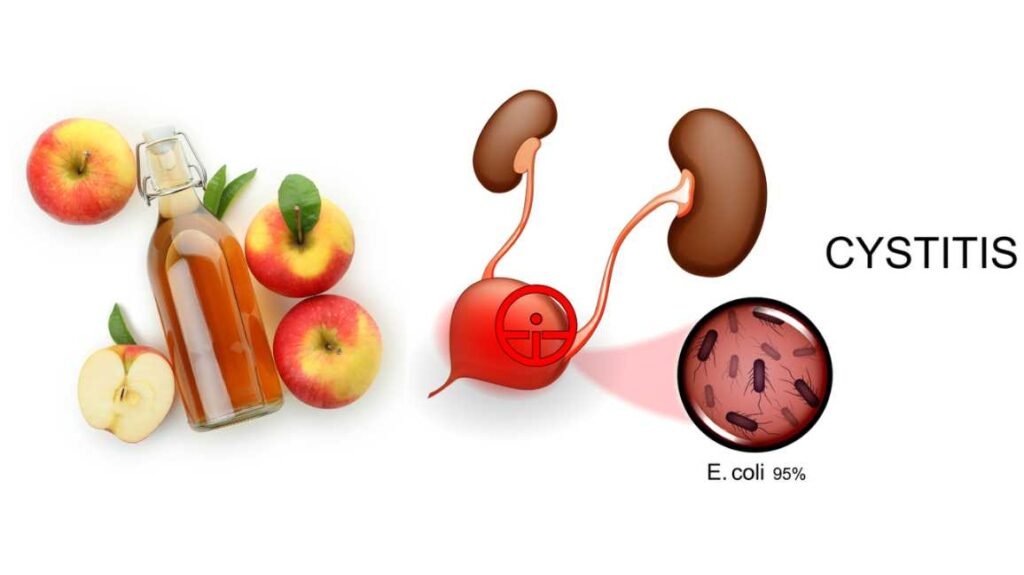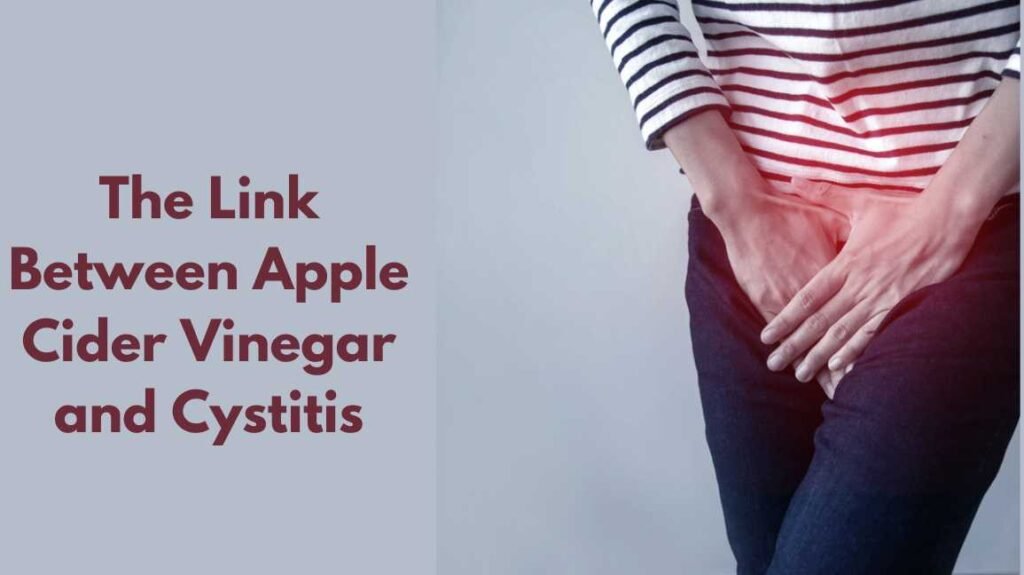Can Apple Cider Vinegar Cause Cystitis? Discover the Truth

Cystitis is a prevalent urinary tract infection that affects millions of people every year. It can lead to discomfort and pain in the bladder and lower abdomen, along with frequent or urgent urination.
On the other hand, apple cider vinegar is a popular natural remedy that has been touted for its various health benefits, including helping with weight loss and improving digestion.
However, there have been some claims that apple cider vinegar can also cause or worsen cystitis. In this article, we will examine the evidence and see if there is any truth to these claims.
Understanding Cystitis and Its Common Symptoms
Before we can determine if apple cider vinegar can cause cystitis, it’s essential to understand what cystitis is and how it typically occurs.
Cystitis is a type of urinary tract infection (UTI) that affects the bladder and sometimes the urethra. Typically, it occurs when bacteria enter the urinary tract through the urethra and multiply in the bladder.
This can lead to inflammation and irritation of the bladder walls, resulting in cystitis symptoms such as:
- Frequent or urgent urination
- Burning or pain during urination
- Blood in urine
- Cloudy or strong-smelling urine
- Lower abdominal pain or discomfort
Cystitis can occur in anyone but is more common in women due to their shorter urethra, making it easier for bacteria to enter the bladder.
Understanding Apple Cider Vinegar and Its Historical Uses
Apple cider vinegar (ACV) is produced by fermenting apple juice. The fermentation process involves crushing apples and squeezing out the liquid, to which bacteria and yeast are added to start the alcoholic fermentation process.
The sugars in the apple juice are converted to alcohol, and then through further fermentation, bacteria convert the alcohol into acetic acid, which is the main active compound in vinegar.
Historically, ACV has been used in various cultures for its medicinal properties, dietary benefits, and as a natural disinfectant. Some of the claimed benefits of ACV include:
- Aiding in weight loss
- Regulating blood sugar levels
- Improving digestion and gut health
- Lowering cholesterol levels
However, most of these claims lack scientific evidence and are primarily based on anecdotal reports.
The Link Between Apple Cider Vinegar and Cystitis

Now, let’s address the main question: can ACV cause cystitis?
The short answer is no. There is currently no scientific evidence to suggest that apple cider vinegar can directly cause cystitis.
However, there are a few potential ways in which ACV could indirectly contribute to the development or worsening of cystitis. These include:
1. Irritation of the Bladder Lining: ACV is acidic, and in some individuals, consuming or using highly acidic substances might irritate the bladder lining, potentially aggravating symptoms in those already prone to UTIs or sensitive bladders.
2. Allergic Reactions: Although rare, some people may have an allergic reaction to ACV, which could lead to symptoms similar to cystitis or exacerbate existing symptoms.
3. Imbalanced Vaginal pH: Using ACV as a vaginal douche or in other personal care products can disrupt the natural pH balance of the vagina, potentially leading to bacterial imbalances that might increase the risk of UTIs, including cystitis.
While ACV’s direct link to cystitis is unproven, those prone to bladder irritation or UTIs might consider moderating their ACV use or consulting a healthcare professional before adding it to their diet.
Also Read: Is It Safe to Consume Apple Cider Vinegar After Gastric Sleeve Surgery?
Risk Factors for Developing Cystitis
Several factors can increase the likelihood of developing cystitis, including:
1. Sexual Activity: Sexual activity can introduce bacteria into the urinary tract.
2. Use of Certain Contraceptives: Spermicides and diaphragms can increase the risk of urinary tract infections.
3. Menopause: Declining estrogen levels can lead to changes in the urinary tract, making women more susceptible to infections.
4. Urinary Catheters: Long-term use of urinary catheters can introduce bacteria into the bladder.
5. Suppressed Immune System: Conditions like diabetes or treatments such as chemotherapy can weaken the immune system, making infections more likely.
6. Blockages in the Urinary Tract: Kidney stones or an enlarged prostate can obstruct urine flow, leading to an increased risk of infection.
Tips for Consuming Apple Cider Vinegar Safely
If you’re considering incorporating apple cider vinegar into your diet or personal care routine, here are some tips to keep in mind:
1. Dilute ACV: Always dilute apple cider vinegar with water before consuming it to reduce its acidity and minimize potential irritation to the digestive system and bladder.
2. Limit Intake: Begin with small amounts, such as one to two teaspoons mixed in a large glass of water, and monitor how your body responds before gradually increasing the dosage if needed.
3. Use it Sparingly: Avoid excessive or frequent use of ACV, especially if you are prone to bladder issues or UTIs.
4. Avoid Direct Application: Do not use ACV directly on the skin or mucous membranes, including as a vaginal douche, as it can disrupt the natural pH balance and cause irritation or infection.
5. Consult Healthcare Providers: Speak with a doctor or healthcare professional before incorporating ACV into your routine, particularly if you have a history of UTIs or other urinary tract issues.
Strategies for Managing or Preventing Cystitis
To manage or prevent cystitis, consider the following strategies:
1. Stay Hydrated: Stay well-hydrated to help flush bacteria from your urinary tract.
2. Urinate Frequently: Don’t hold your urine for prolonged periods. Urinating frequently decreases the chance for bacteria to grow.
3. Wipe Properly: Women should always wipe from front to back to prevent bacteria from the anal region from entering the urethra.
4. Practice Good Sexual Hygiene: Urinate shortly after sexual activity to help clear any bacteria that may have been introduced.
5. Wear Comfortable Clothing: Opt for loose-fitting clothing and cotton underwear to ensure proper air circulation and prevent moisture build-up.
6. Choose Gentle Products: Use mild, unscented soaps and products to avoid irritating the genital area.
Also Read: Is It Safe to Take Apple Cider Vinegar and Magnesium Citrate Together?
Conclusion
In summary, there is no direct link between apple cider vinegar and cystitis. However, some potential indirect connections exist, and individuals prone to UTIs or bladder irritation should exercise caution when incorporating ACV into their routine.
It’s essential to consult with a healthcare professional before making any significant changes to diet or personal care habits to ensure safety and effectiveness. Additionally, following good hygiene practices and staying hydrated can help prevent or manage cystitis effectively.
FAQs
Can apple cider vinegar cure cystitis?
No, apple cider vinegar cannot cure cystitis. There is no scientific evidence to support the claim that ACV can treat or cure the infection. Cystitis, often caused by bacterial infections, typically requires medical treatment such as antibiotics prescribed by a healthcare professional.
Is it safe to use apple cider vinegar as a vaginal douche?
No, it is not safe to use apple cider vinegar as a vaginal douche. Using ACV in this manner can disrupt the natural pH balance of the vagina, potentially leading to irritation, infections, or other complications.
Can men develop cystitis?
Yes, men can develop cystitis, although it is less common than in women. In men, cystitis is often related to an underlying condition such as a urinary tract blockage (like kidney stones or an enlarged prostate), or a result of urinary catheters or other medical procedures involving the urinary tract.
Useful Resources
WebMD- Apple Cider Vinegar – Uses, Side Effects, and More
Mayoclinic- Cystitis



